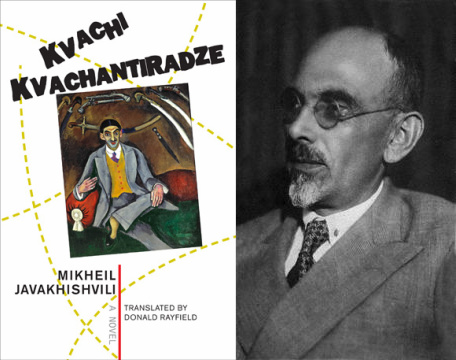On the first of April that year the weather in Samtredia was stranger than usual. A pitch-black cloud hung over the earth from the morning onwards. Snow, hail, rain and, sometimes, spring sunshine alternated; after a while there was such a gale that the whole township rattled and shook, then a calm silence would descend and you wouldn’t see the slightest movement of a cloud in the sky.
So the first of April in Samtredia started in confusion: it was a deceitful, false, and treacherous day.
That day, in Silibistro Kvachantiradze’s house, which was on the road to Khoni, there was a great deal of commotion and fuss: Silibistro’s wife Pupi was giving birth to her first child. The whole family was up and about. The woman’s labor was attended by her mother Notio, her grandmother, and the womenfolk from next door, while Silibistro and his father Khukhu Chichia were waiting in the other room, worrying about their first heir.
As midday approached, everything seemed to go dark, as if it were night. The earth stopped being calm and suddenly quaked and shook. There was a terrible storm. The whole land groaned, moaned, and thundered. The Kvachantiradzes’ wooden house bent this way and that, it rattled, it lifted its eaves, as if trying to fly away. Pupi shrieked in her labor, while the others, horrorstruck and frightened, ran about like headless chickens.
There was a sudden flash of lightning, so bright that it blinded everyone for a few seconds, and that same instant the heavens thundered horribly and Pupi uttered a scream, while the earth quaked, so that some of those present were petrified, some bent double, and others made a dash for the door. There was a moment’s silence and then, from the corner of the room, came the cry of the new-born baby:
“Me-e … me-e … me-e …”
So Silibistro Kvachantiradze’s first boy fell for the first time at the feet of his first woman: his own mother Pupi.
Shrieks of joy, havoc, and bustling broke out. It was then precisely twelve o’clock. The storm fell silent and light overcame the darkness.
The sound of the baby’s cry brought Silibistro Kvachantiradze and Khukhu Chichia rushing out of the next room.
“It’s a boy!” the grandmother gave Silibistro and Khukhu the news they had hoped for.
“Thank the Lord!” said Silibistro.
“Glory to the Father and to the Son and to the Holy Ghost!” Khukhu added piously. “Amen.”
“Amen,” the others repeated; they all crossed themselves.
“I name him Kvachi,” declared Silibistro in a solemn voice; the others immediately gave their assent.
Shortly after this the innkeeper’s lad Bardgha rushed up from the ground floor and brought them the news that the poplar tree in the Kvachantiradzes’ garden had been struck by lightning and cleft in two. Worse, the storm had demolished Zhondia’s inn, which had been a serious rival to Kvachantiradze’s “hotel.” Silibistro dashed out to take a look at Zhondia’s wrecked inn: on the way there he found a silver rouble.
An hour later the clouds had cleared and fine spring weather had returned. The sun shone overhead like a resplendent radiant crown. All Samtredia had come out to look with amazement at this crown of light, the remains of Zhondia’s inn, and Kvachantiradze’s split poplar tree.
That was how Kvachi Kvachantiradze was born.
In the evening of the same day Madame Notio opened little Kvachi’s palm as much as she could, read it, thought for a while, and then gave a reading to Pupi, who had now revived, to Silibistro, who was pleased with himself, to Khukhu, who had calmed down, and to Bardgha, who was giving himself airs.
“The gale and the thunder and lightning mean that Kvachi is going to have a childhood with a lot of hardship and ups and downs, but God is merciful. His clenched fist, which I had so much trouble opening, is a sign that nobody’s going to take away anything Kvachi gets his hands on. The sun shining like a crown over him means that a brilliant and famous future awaits little Kvachi, bless his tiny little paws! The lightning striking the poplar tree and devils taking away Zhondia’s inn is a sign that your enemies and Kvachi’s—may the Cross protect us all!—will be struck by lightning and their hearts will be split in two, just as the poplar tree was cleft in two today.”
Everyone found this reading reassuring and comforting. Silibistro said, “I’ve never heard a baby cry like him. He yells nothing but ‘Me-me.’ It sounds as if he’s not going to let anyone else have anything and is going to lay claim to the whole world.”
Everyone laughed.
“How I love my little Kvachi!” Pupi whispered with a smile, as she began to fondle little Kvachi, who had fallen asleep beside her. Little did Silibistro, or Pupi, or Bardgha, or even Khukhu and Notio, know that their predictions and dreams had an element of truth, and that the squawking, mewling Kvachi would eventually realize all their hopes and even exceed them.
***
Selection from Kvachi, by Mikheil Javakhishvili, appears here with the permission of Dalkey Archive Press. Kvachi will be published January 2015.

